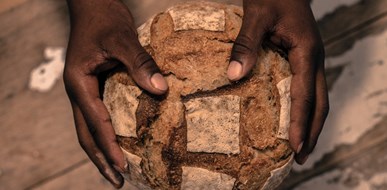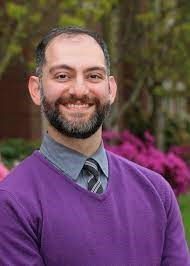[Interview] The sovereignty of sharing: An interview with UN Special Rapporteur Michael Fakhri
Published 10 July 2023
@Pexels - Josh Beaver - "People with less tend to be more generous, recognising the necessity of sharing for survival".
In an interview for OpinioJuris, renowned professor and UN Special Rapporteur on the Right to Food Michael Fakhri sat down with León Castellanos-Jankiewicz, Carl Emilio Lewis, and Melanie Schneider (intern) to discuss the concept of sovereignty, unequal food systems, and the power of community. The interview sheds light on Fakhri's perspective on the movement of food sovereignty, the importance of sharing resources, and his approach as a UN Special Rapporteur.
In the OpinioJuris interview, UN Special Rapporteur on the Right to Food Michael Fakhri frames his mandate as an ongoing engagement with the food sovereignty movement, which emerged in the 1990s as a response to the growing influence of corporate power in food systems. Initially, the movement emphasised state-based concepts, aligning with ideas of permanent sovereignty over natural resources. However, it quickly expanded its scope, incorporating the notions of territory and the responsibilities associated with it. Fakhri highlights that territory goes beyond geographical boundaries and can encompass overlapping jurisdictions and political communities with shared historical, ecological, and geographical connections.
Sharing
Fakhri emphasises the significance of starting with the concept of sharing itself, which challenges the traditional notion of sovereignty as exclusive state power over territory. He points out that sovereignty and property are often intertwined, but the food sovereignty movement advocates for an alternative understanding of property as land tenure, which prioritises stability and long-standing relationships. This communal approach aims to foster equitable distribution and sharing of resources.
Fakhri argues that during the COVID-19 pandemic, for instance, communities demonstrated a heightened sense of responsibility, leading to increased sharing of resources. He emphasises that people with less tend to be more generous, recognising the necessity of sharing for survival.
When asked about his choice to address agrifood industry issues through the lens of Third World Approaches to International Law (TWAIL), Fakhri explains that his approach was shaped by his training and experiences. He focused on analysing power dynamics to clarify what is at stake. Fakhri underscores the importance of examining the mechanisms that enable or disable people from organising and being mindful of his own expertise as an expert.
In his role as UN Special Rapporteur, Michael Fakhri acknowledges the limitations of certain political spaces, such as the Security Council, in addressing food-related challenges. He cautions against viewing food solely as a security issue and advocates for a broader perspective that considers the complex and multifaceted nature of food systems.
Human rights and trade
Fakhri also addresses the role of human rights, particularly the right to food, as a platform for discussions, emphasising the importance of language and effective communication to engage diverse audiences. Yet, he remains aware of the limitations of human rights. Fakhri: “Because I come from a tradition of TWAIL which is inherently suspicious of human rights, I want to advance human rights as one way of doing things, amongst a lot of other different ways (…) To do this, I introduce more ingredients like political economy and trade.”
According to Fakhri, we need to talk more about the commodification of food through trade and other financial instruments: “What’s interesting to me is whether we can imagine markets, the buying and selling of food, and the commercial practices necessary for the making, sharing and eating of food, in a way that is not about commodifying food as such, or treating food as any other item that can be bought and sold that way.”
Internal conflict
In the last part of the interview, Michael Fakhri reflects on the internal conflict that international lawyers often face regarding the potential of international law to address global challenges, highlighting the ongoing negotiations for a treaty on business and human rights. Fakhri acknowledges that his own perspective on the treaty has evolved, influenced by engaging with social movements and remaining open-minded to different viewpoints.
When asked about the internal conflict that many international lawyers face on the potential of international law to tackle global challenges, Fakhri says : (…) “I think many international lawyers have (this conflict – ed) within themselves; something between hope and resignation when thinking about what can be achieved through international law. (…) It’s not about being critical or mainstream, or orthodox or heterodox; it’s essentially this: are you a good lawyer, or a bad lawyer?
A good lawyer has to acknowledge and confront that tension internally in themselves and in the discipline all the time, and it is neither a strength or weakness, it is just the nature of being human. Am I part of the system? Am I in the system? Am I against the system? What is the system? All of those questions. That's just the nature of law. Law is always about navigating competing interests in the sense of practice. (…) There isn’t the way; there's a complex jumble of messiness. (…) Can you be a good person and a good lawyer? And I mean that in moral terms. Can you live with yourself? This is ultimately all you have, right?”
Read the full interview (Part 1 and Part 2).

Prof. Michael Fakhri
Read more
The 8th Annual T.M.C. Asser Lecture titled ‘The right to food, violence, and food systems’ was delivered by Michael Fakhri, UN Rapporteur on Food on April 20, 2023. During this highly engaging lecture, Fakhri examined forms of violence in food systems, to allow for a better understanding of how food systems operate and to reframe how the right to food is addressed in international law. Watch the recording of the lecture.
